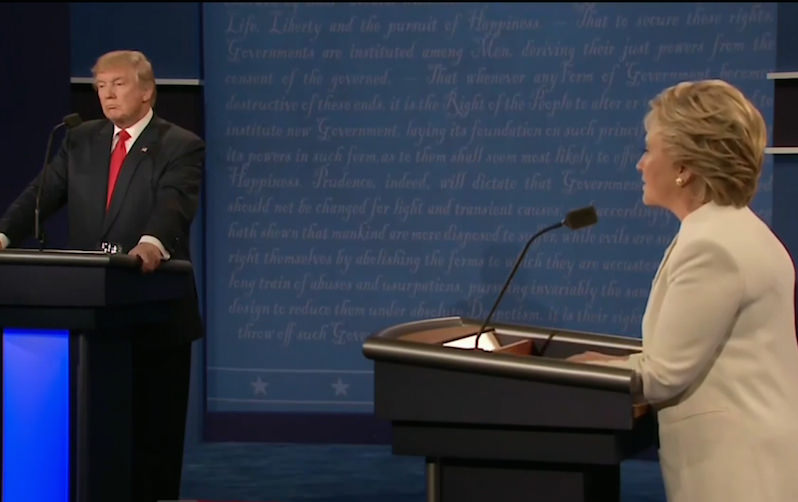Cast Your Vote: Did the Presidential Debates Make an Impact?
This week marked the third—and final—bout between the nominees before Americans head to the polls. We want to hear from you: Did these faceoffs influence how citizens will mark their ballots?
Donald Trump and Hillary Clinton during the third presidential debate. (Screen shot via Politico)
Republican presidential nominee Donald Trump tweeted Friday morning, “The results are in on the final debate and it is almost unanimous, I WON!” This came two days after the third and final presidential debate between Trump and his Democratic rival, Hillary Clinton.
After each debate, the media, political pundits and swarms of internet commenters have been quick to decide the “winner” of the night’s exchange. While there is no shortage of analysis, ultimately it’s hard to tell whether the debates had any effect on voters’ decisions.
Let’s take a look at the content of Wednesday’s debate. Truthdig contributor Bill Blum summed up the feelings of many viewers with his comments:
The best thing I can say about the third and final presidential debate is that it’s over. I feel like I need a good shower. … We are left in this election with a choice (sorry, my fellow progressives, Jill Stein isn’t going to win) between a malignant, narcissistic protofascist and a lying neoliberal warmonger.
Truthdig’s Managing Editor Eric Ortiz, who ran our debate live blog, expressed similar sentiments. “Who won? Not the American people,” he wrote. “The Democratic and Republican options this year both have serious flaws. It will be a hold-your-nose-and-vote kind of election year for a lot of people.”
Truthdig contributor Sonali Kolhatkar, who was in Las Vegas for the debate, expanded upon the criticism of Clinton and Trump’s exchange. “Although the debate lasted an hour and a half and covered a range of issues, in actuality, the focus was extremely limited,” she wrote. “Had Green Party presidential nominee Jill Stein been allowed to debate Trump and Clinton, she surely would have raised the issue of overspending on the military.”
This brings us to what many see as the downfall of this year’s election season: the lack of third-party inclusion. Kolhatkar explained why many students at the University of Nevada, Las Vegas, were let down:
After the debate ended, UNLV honors student and biology major Joel Jiminez told me he disliked that the candidates seemed to be “focusing on their own personal issues, and … not talking about the actual issues that we care about.” He wished there were more options and that third-party candidates Gary Johnson and Jill Stein had been allowed to participate.
The Green Party certainly is trying to change this closed-off process for future elections. Truthdig Associate Editor Alexander Kelly spoke with Jill Stein, the Greens’ presidential nominee, earlier this week. “We not only have a right to vote; we have a right to know who we can vote for, and that means we need to open up the debates,” Stein said. These kinds of changes may come about if voters tune in to social media—think Stein’s online “debate” on Facebook—and also give the Green Party support Nov. 8.
“Right now, according to the polls, we are near the threshold for achieving major-party status,” Stein continued. “If we get 5 percent” of the vote, she said, that would open up future opportunities for the Green Party by providing it with funds and giving it a place on ballots. Green vice presidential nominee Ajamu Baraka elaborated in an interview earlier this week: “Five percent of the vote is really important for us.”
For many Americans, however, the presidential debates may have been a deciding factor in how to vote. Wednesday’s debate attracted the third-highest number of viewers in the history of presidential debates. (Clinton and Trump’s first debate is the record holder.) This is important because, according to Vox, “debates have the potential to make a small but real impact on the race.” Clinton has continued to gain an advantage over Trump in the polls over the last few months, although Trump’s inappropriate comments are probably to blame for his opponent’s new lead.
The venue for the town-hall styled second debate was filled with undecided voters. Anecdotal evidence shows that even after the third and final debate, many undecided voters were still unsure, and news outlets reported conflicting results. MSNBC, for example, aired a segment in which a Democratic strategist stated that Trump’s performance Wednesday night “may have sabotaged his last remaining opportunity to sway those coveted undecided voters,” while a CNN focus group of undecideds chose “Donald Trump as the winner of the third debate, by a margin of 10-5.”
Based on a poll we at Truthdig conducted at the end of August, a majority of our readers overwhelmingly preferred Stein for president. But regardless of your own preference, we want to hear from you now: Did you watch the presidential debates? If so, do you think they had the power to sway undecided voters—or were they just a “reality show” and a “big mockery”?
Let us know in the poll below. One vote per person, please. (Make your selection and then click on “Vote.” To see results of the polling, click on “Results.”)
Independent journalism is under threat and overshadowed by heavily funded mainstream media.
You can help level the playing field. Become a member.
Your tax-deductible contribution keeps us digging beneath the headlines to give you thought-provoking, investigative reporting and analysis that unearths what's really happening- without compromise.
Give today to support our courageous, independent journalists.






You need to be a supporter to comment.
There are currently no responses to this article.
Be the first to respond.